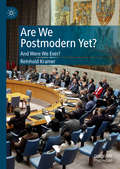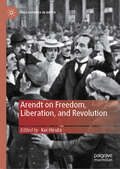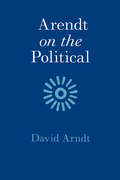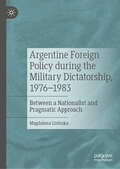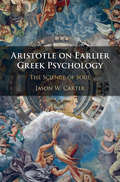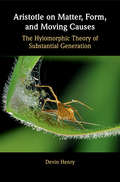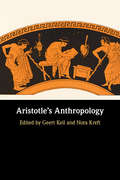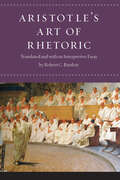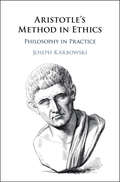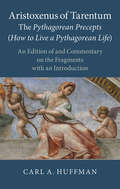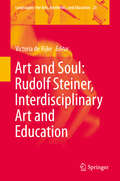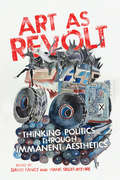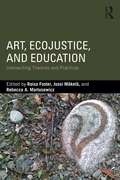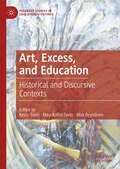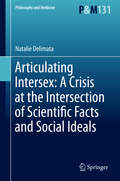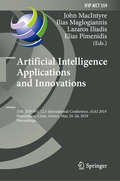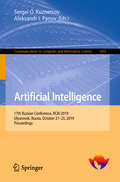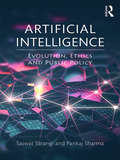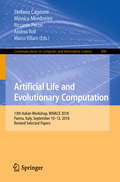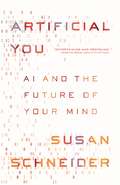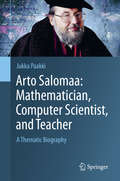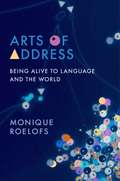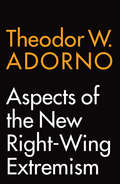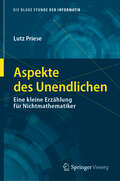- Table View
- List View
Are We Postmodern Yet?: And Were We Ever?
by Reinhold KramerIn this book, Reinhold Kramer explores a variety of important social changes, including the resistance to objective measures of truth, the rise of “How-I-Feel” ethics, the ascendancy of individualism, the immersion in cyber-simulations, the push toward globalization and multilateralism, and the decline of political and religious faiths. He argues that the displacement, since the 1990s, of grand narratives by ego-based narratives and small narratives has proven inadequate, and that selective adherence, pluralist adaptation, and humanism are more worthy replacements. Relying on evolutionary psychology as much as on Charles Taylor, Kramer argues that no single answer is possible to the book title’s question, but that the term “postmodernity” – referring to the era, not to postmodernism – still usefully describes major currents within the contemporary world.
Arendt on Freedom, Liberation, and Revolution (Philosophers in Depth)
by Kei HirutaThis edited volume focuses on what Hannah Arendt famously called “the raison d’être of politics”: freedom. The unique collection of essays clarifies her flagship idea of political freedom in relation to other key Arendtian themes such as liberation, revolution, civil disobedience, and the right to have rights. In addressing these, contributors to this volume juxtapose Arendt with a number of thinkers from Isaiah Berlin, John Rawls and Philip Pettit to Karl Marx, Frantz Fanon and Geoffroy de Lagasnerie. They also consider the continuing relevance of Arendt’s work to some of the most dramatic events in recent years, including the current global refugee crisis, the Arab uprisings of the 2010s, and the ongoing crisis of liberal democracy in the West and beyond. Contributors include Keith Breen, Joan Cocks, Tal Correm, Christian J. Emden, Patrick Hayden, Kei Hiruta, Anthony F. Lang Jr., Shmuel Lederman, Miriam Leonard, Natasha Saunders, William Smith, and Shiyu Zhang.
Arendt on the Political
by David ArndtWhat is politics? How is politics different from other spheres of human life? What is behind the debasement of political life today? This book argues that the most illuminating answers to these questions have come from Hannah Arendt. Arendt held that Western philosophy has never had a 'pure concept of the political', and that political philosophers have been guided and misguided by the assumptions implicit in their metaphysical questions. Her project was 'to look at politics … with eyes unclouded by philosophy', and to retrieve the non-theoretical understanding of politics implicit in ancient Greek literature and history. David Arndt's original and accessible study shows how Arendt reworked some of the basic concepts of political philosophy, which in turn led her to a re-interpretation of American political history and even to a profoundly original reading of the US Declaration of Independence.
Argentine Foreign Policy during the Military Dictatorship, 1976–1983: Between a Nationalist and Pragmatic Approach
by Magdalena LisińskaThis book examines Argentine foreign policy under the military dictatorship from 1976–1983, also known as the National Reorganization Process. It brings together case studies on the most distinctive decisions and key issues in the regime’s foreign relations, including the international response to human rights violations, the dispute with Chile over the Beagle Channel, covert operations in Central America, the Argentine nuclear program, and the Falklands War. Lisińska examines the influence of ideological factors on foreign policy decisions, highlighting the relationship between the nationalism shaping the military’s policy goals and its pragmatic approach to achieving them.
Aristotle on Earlier Greek Psychology: The Science of Soul
by Jason W. CarterThis volume is the first in English to provide a full, systematic investigation into Aristotle's criticisms of earlier Greek theories of the soul from the perspective of his theory of scientific explanation. Some interpreters of the De Anima have seen Aristotle's criticisms of Presocratic, Platonic, and other views about the soul as unfair or dialectical, but Jason W. Carter argues that Aristotle's criticisms are in fact a justified attempt to test the adequacy of earlier theories in terms of the theory of scientific knowledge he advances in the Posterior Analytics. Carter proposes a new interpretation of Aristotle's confrontations with earlier psychology, showing how his reception of other Greek philosophers shaped his own hylomorphic psychology and led him to adopt a novel dualist theory of the soul–body relation. His book will be important for students and scholars of Aristotle, ancient Greek psychology, and the history of the mind–body problem.
Aristotle on Matter, Form, and Moving Causes: The Hylomorphic Theory of Substantial Generation
by Devin HenryThis book examines an important area of Aristotle's philosophy: the generation of substances. While other changes presuppose the existence of a substance (Socrates grows taller), substantial generation results in something genuinely new that did not exist before (Socrates himself). The central argument of this book is that Aristotle defends a 'hylomorphic' model of substantial generation. In its most complete formulation, this model says that substantial generation involves three principles: (1) matter, which is the subject from which the change proceeds; (2) form, which is the end towards which the process advances; and (3) an efficient cause, which directs the process towards that form. By examining the development of this model across Aristotle's works, Devin Henry seeks to deepen our grasp on how the doctrine of hylomorphism - understood as a blueprint for thinking about the world - informs our understanding of the process by which new substances come into being.
Aristotle's Anthropology
by Geert Keil Nora KreftThis is the first collection of essays devoted specifically to the nature and significance of Aristotle's anthropological philosophy, covering the full range of his ethical, metaphysical and biological works. The book is organised into four parts, two of which deal with the metaphysics and biology of human nature and two of which discuss the anthropological foundations and implications of Aristotle's ethico-political works. The essay topics range from human nature and morality to friendship and politics, including original discussion and fresh perspectives on rationalism, the intellect, perception, virtue, the faculty of speech and the differences and similarities between human and non-human animals. Wide-ranging and innovative, the volume will be highly relevant for readers studying Aristotle as well as for anyone working on either ancient or contemporary philosophical anthropology.
Aristotle's Art of Rhetoric
by AristotleA “singularly accurate, readable, and elegant translation [of] this much-neglected foundational text of political philosophy” (Peter Ahrensdorf, Davidson College).For more than two thousand years, Aristotle’s“Art of Rhetoric” has shaped thought on the theory and practice of persuasive speech. In three sections, Aristotle defines three kinds of rhetoric (deliberative, judicial, and epideictic); discusses three rhetorical modes of persuasion; and describes the diction, style, and necessary parts of a successful speech. Throughout, Aristotle defends rhetoric as an art and a crucial tool for deliberative politics while also recognizing its capacity to be misused by unscrupulous politicians to mislead or illegitimately persuade others.Here Robert C. Bartlett offers an authoritative yet accessible new translation of Aristotle’s “Art of Rhetoric,” one that takes into account important alternatives in the manuscript and is fully annotated to explain historical, literary, and other allusions. Bartlett’s translation is also accompanied by an outline of the argument of each book; copious indexes, including subjects, proper names, and literary citations; a glossary of key terms; and a substantial interpretive essay.
Aristotle's Method in Ethics: Philosophy in Practice
by Joseph KarbowskiThis book examines Aristotle's method in ethics from the vantage point of his broader conception of philosophy. Joseph Karbowski challenges longstanding dialectical orthodoxy and argues instead that, in his ethical treatises, Aristotle is seeking the first principles of a demonstrative ethical science, a science of human goodness, using an ethically adapted version of the method described in the second book of his Posterior Analytics. Part I of this volume develops a novel interpretation of Aristotle's conception of philosophy, which highlights its ambition to scientific knowledge (epistēmē) and its flexible approach to philosophical inquiry. Part II then demonstrates Aristotle's scientific and flexible approach to philosophy at work in his ethical treatises. The book shows how the aspiration to scientific knowledge is compatible with Aristotle's remarks about ethical precision, the practical aim of ethics, and the particular orientedness of phronēsis (practical wisdom).
Aristoxenus of Tarentum (How to Live a Pythagorean Life): An Edition of and Commentary on the Fragments with an Introduction
by Carl A. HuffmanThe Pythagorean Precepts by Aristotle's pupil, Aristoxenus of Tarentum, present the principles of the Pythagorean way of life that Plato praised in the Republic. They are our best guide to what it meant to be a Pythagorean in the time of Plato and Aristotle. The Precepts have been neglected in modern scholarship and this is the first full edition and translation of and commentary on all the surviving fragments. The introduction provides an accessible overview of the ethical system of the Precepts and their place not only in the Pythagorean tradition but also in the history of Greek ethics as a whole. The Pythagoreans thought that human beings were by nature insolent and excessive and that they could only be saved from themselves if they followed a strictly structured way of life. The Precepts govern every aspect of life, such as procreation, abortion, child rearing, friendship, religion, desire and even diet.
Art and Soul: Rudolf Steiner, Interdisciplinary Art and Education (Landscapes: the Arts, Aesthetics, and Education #25)
by Victoria De RijkeThis book brings together Steiner's philosophical, biodynamic and cultural contributions to education, where 'spirit' and ‘soul’ are the creative elements in human evolution. His thought is applied to selected examples of innovative artistic practice and pedagogy of the present. This volume is intended for researchers in the arts and education with an interest in Rudolf Steiner's huge influence on educational thought and policy.This is an urgent point in time to reflect on the role of arts in education and what it might mean for our souls. An accessible yet scholarly study of interdisciplinarity, imagination and creativity is of critical widespread interest now, when arts education in many countries is threatened with near-extinction.
Art as Revolt: Thinking Politics through Immanent Aesthetics
by Hans Skott-Myhre David FancyHow can we imagine a future not driven by capitalist assumptions about humans and the wider world? How are a range of contemporary artistic and popular cultural practices already providing pathways to post-capitalist futures? Authors from a variety of disciplines answer these questions through writings on blues and hip hop, virtual reality, post-colonial science fiction, virtual gaming, riot grrrls and punk, raku pottery, post-pornography fanzines, zombie films, and role playing. The essays in Art as Revolt are clustered around themes such as technology and the future, aesthetics and resistance, and ethnographies of the self beyond traditional understandings of identity. Using philosophies of immanence – describing a system that gives rise to itself, independent of outside forces – drawn from a rich and evolving tradition that includes Spinoza, Nietzsche, Deleuze, and Braidotti, the authors and editors provide an engrossing range of analysis and speculation. Together the essays, written by experts in their fields, stage an important collective, transdisciplinary conversation about how best to talk about art and politics today. Sophisticated in its theoretical and philosophical premises, and engaging some of the most pressing questions in cultural studies and artistic practice today, Art as Revolt does not provide comfortable closure. Instead, it is understood by its authors to be a “Dionysian machine,” a generator of open-ended possibility and potential that challenges readers to affirm their own belief in the futures of this world. Contributors include Timothy J. Beck (University of West Georgia) Mark Bishop (Independent Scholar), Dave Collins (University of West Georgia), David Fancy (Brock University), Veronica Pacini-Ketchabaw (University of Western Ontario), Malisa Kurtz (Independent Scholar), Nicole Land (Ryerson University), Eric Lochhead (Youth Author Calgary Alberta) , Douglas Ord (Doctoral Student University of Western Ontario), Peter Rehberg (Institute for Cultural Inquiry—Berlin), Chris Richardson (Young Harris College), Hans Skott-Myhre (Kennesaw State University), Kathleen Skott-Myhre (University of West Georgia), and Joanna Wasiak (Independent Scholar).
Art as Revolt: Thinking Politics through Immanent Aesthetics
by David Fancy and Hans Skott-MyhreHow can we imagine a future not driven by capitalist assumptions about humans and the wider world? How are a range of contemporary artistic and popular cultural practices already providing pathways to post-capitalist futures? Authors from a variety of disciplines answer these questions through writings on blues and hip hop, virtual reality, post-colonial science fiction, virtual gaming, riot grrrls and punk, raku pottery, post-pornography fanzines, zombie films, and role playing. The essays in Art as Revolt are clustered around themes such as technology and the future, aesthetics and resistance, and ethnographies of the self beyond traditional understandings of identity. Using philosophies of immanence – describing a system that gives rise to itself, independent of outside forces – drawn from a rich and evolving tradition that includes Spinoza, Nietzsche, Deleuze, and Braidotti, the authors and editors provide an engrossing range of analysis and speculation. Together the essays, written by experts in their fields, stage an important collective, transdisciplinary conversation about how best to talk about art and politics today. Sophisticated in its theoretical and philosophical premises, and engaging some of the most pressing questions in cultural studies and artistic practice today, Art as Revolt does not provide comfortable closure. Instead, it is understood by its authors to be a “Dionysian machine,” a generator of open-ended possibility and potential that challenges readers to affirm their own belief in the futures of this world. Contributors include Timothy J. Beck (University of West Georgia), Mark Bishop (Independent Scholar), Dave Collins (University of West Georgia), David Fancy (Brock University), Veronica Pacini-Ketchabaw (University of Western Ontario), Malisa Kurtz (Independent Scholar), Nicole Land (Ryerson University), Eric Lochhead (Youth Author Calgary Alberta), Douglas Ord (Doctoral Student University of Western Ontario), Joanna Perkins (Independent Scholar), Peter Rehberg (Institute for Cultural Inquiry—Berlin), Chris Richardson (Young Harris College), Hans Skott-Myhre (Kennesaw State University), and Kathleen Skott-Myhre (University of West Georgia).
Art, EcoJustice, and Education: Intersecting Theories and Practices
by Rebecca A. Martusewicz Raisa Foster Jussi MäkeläEmphasizing the importance of contemporary art forms in EcoJustice Education, this book examines the interconnections between social justice and ecological well-being, and the role of art to enact change in destructive systems. Artists, educators, and scholars in diverse disciplines from around the world explore the power of art to disrupt ways of thinking that are taken for granted and dominate modern discourses, including approaches to education. The EcoJustice framework presented in this book identifies three strands—cultural ecological analysis, revitalizing the commons, and enacting imagination—that help students to recognize the value in diverse ways of knowing and being, reflect on their own assumptions, and develop their critical analytic powers in relation to important problems. This distinctive collection offers educators a mix of practical resources and inspiration to expand their pedagogical practices. A Companion Website includes interactive artworks, supplemental resources, and guiding questions for students and instructors.
Art, Excess, and Education: Historical and Discursive Contexts (Palgrave Studies in Educational Futures)
by Kevin Tavin Mira Kallio-Tavin Max RyynänenThis book concentrates on the deep historical, political, and institutional relationships between art, education, and excess. Going beyond field specific discourses of art history, art criticism, philosophy, and aesthetics, it explores how the concept of excess has been important and enduring from antiquity through contemporary art, and from early film through the newer interactive media. Examples considered throughout the book focus on disgust, grandiosity, sex, violence, horror, disfigurement, endurance, shock, abundance, and emptiness, and frames them all within an educational context. Together they provide theories and classificatory systems, historical and political interpretations of art and excess, examples of popular culture, and suggestions for the future of educational practice.
Articulating Intersex: A Crisis at the Intersection of Scientific Facts and Social Ideals (Philosophy and Medicine #131)
by Natalie DelimataThis book explores the ethical dilemma clinicians may face when disclosing a diagnosis of atypical sex. The moment of disclosure reveals an epistemic incompatibility between scientific fact and social meaning in relation to sex. Attempting to assess the bio-psychosocial implications of this dilemma highlights a complex historic antagonism between fact and meaning making satisfactory resolution of this dilemma difficult. Drawing on David Hume, WVO Quine and Michel Foucault the author presents an integrative model, which views scientific fact and social meaning as codetermining threads in one fabric of knowledge. From this epistemic perspective, the ethical dilemma is understood as a tear in the fabric signifying a rupturing of ontological integrity. To mend this tear and resolve the ethical dilemma three metaphysical perspectives are considered: essentialism, naturalism and emergentism. The book’s unique features include: an exploration of the impact of diagnostic disclosure on people with atypical sex (intersex); a synthesis of the epistemic perspectives of social and natural science facilitating interdisciplinary collaboration; a critical evaluation of three metaphysical perspectives on atypical sex (intersex); the application of Hume’s epistemological and moral distinctions to contemporary biomedicine and bioethics. The book’s target audience includes academics, students and professionals whose work intersects the natural and social sciences, and individuals interested in the metaphysics, epistemology and meta-ethics of sex.
Artificial Intelligence Applications and Innovations: 15th IFIP WG 12.5 International Conference, AIAI 2019, Hersonissos, Crete, Greece, May 24–26, 2019, Proceedings (IFIP Advances in Information and Communication Technology #559)
by Elias Pimenidis Lazaros Iliadis Ilias Maglogiannis John MacIntyreThis book constitutes the refereed proceedings of the 15th IFIP WG 12.5 International Conference on Artificial Intelligence Applications and Innovations, AIAI 2019, held in Hersonissos, Crete, Greece, in May 2019.The 49 full papers and 6 short papers presented were carefully reviewed and selected from 101 submissions. They cover a broad range of topics such as deep learning ANN; genetic algorithms - optimization; constraints modeling; ANN training algorithms; social media intelligent modeling; text mining/machine translation; fuzzy modeling; biomedical and bioinformatics algorithms and systems; feature selection; emotion recognition; hybrid Intelligent models; classification - pattern recognition; intelligent security modeling; complex stochastic games; unsupervised machine learning; ANN in industry; intelligent clustering; convolutional and recurrent ANN; recommender systems; intelligent telecommunications modeling; and intelligent hybrid systems using Internet of Things. The papers are organized in the following topical sections:AI anomaly detection - active learning; autonomous vehicles - aerial vehicles; biomedical AI; classification - clustering; constraint programming - brain inspired modeling; deep learning - convolutional ANN; fuzzy modeling; learning automata - logic based reasoning; machine learning - natural language; multi agent - IoT; nature inspired flight and robot; control - machine vision; and recommendation systems.
Artificial Intelligence: 17th Russian Conference, RCAI 2019, Ulyanovsk, Russia, October 21–25, 2019, Proceedings (Communications in Computer and Information Science #1093)
by Sergei O. Kuznetsov Aleksandr I. PanovThis book constitutes the proceedings of the 17th Russian Conference on Artificial Intelligence, RCAI 2019, held in Ulyanovsk, Russia, in October 2019. The 23 full papers presented along with 7 short papers in this volume were carefully reviewed and selected from 130 submissions. The conference deals with a wide range of topics, including multi-agent systems, intelligent robots and behaviour planning; automated reasoning and data mining; natural language processing and understanding of texts; fuzzy models and soft computing; intelligent systems and applications.
Artificial Intelligence: Evolution, Ethics and Public Policy
by Pankaj Sharma Saswat SarangiWhat will the future be? A dystopian landscape controlled by machines or a brave new world full of possibilities? Perhaps the answer lies with Artificial Intelligence (AI)—a phenomenon much beyond technology that has, continues to, and will shape lives in ways we do not understand yet. This book traces the evolution of AI in contemporary history. It analyses how AI is primarily being driven by "capital" as the only "factor of production" and its consequences for the global political economy. It further explores the dystopian prospect of mass unemployment by AI and takes up the ethical aspects of AI and its possible use in undermining natural and fundamental rights. A tract for the times, this volume will be a major intervention in an area that is heavily debated but rarely understood. It will be essential reading for researchers and students of digital humanities, politics, economics, science and technology studies, physics, and computer science. It will also be key reading for policy makers, cyber experts and bureaucrats.
Artificial Life and Evolutionary Computation: 13th Italian Workshop, WIVACE 2018, Parma, Italy, September 10–12, 2018, Revised Selected Papers (Communications in Computer and Information Science #900)
by Stefano Cagnoni Marco Villani Andrea Roli Monica Mordonini Riccardo PecoriThis book constitutes the revised selected papers of the 13th Italian Workshop on Artificial Life and Evolutionary Computation, WIVACE 2018, held in Parma, Italy, in September 2018. The 12 full papers presented were thoroughly reviewed and selected from 30 submissions. They cover the following topics: Boolean networks and complex systems; economic, societal and technological applications; chemical, biological and medical applications. The chapter “Unveiling Latent Relations in the Photonics Techno-Economic Complex System” is open access under a CC BY 4.0 license at link.springer.com.
Artificial You: AI and the Future of Your Mind
by Susan SchneiderA sober-minded philosophical exploration of what AI can and cannot achieveHumans may not be Earth’s most intelligent beings for much longer: the world champions of chess, Go, and Jeopardy! are now all AIs. Given the rapid pace of progress in AI, many predict that it could advance to human-level intelligence within the next several decades. From there, it could quickly outpace human intelligence. What do these developments mean for the future of the mind?In Artificial You, Susan Schneider says that it is inevitable that AI will take intelligence in new directions, but urges that it is up to us to carve out a sensible path forward. As AI technology turns inward, reshaping the brain, as well as outward, potentially creating machine minds, it is crucial to beware. Homo sapiens, as mind designers, will be playing with "tools" they do not understand how to use: the self, the mind, and consciousness. Schneider argues that an insufficient grasp of the nature of these entities could undermine the use of AI and brain enhancement technology, bringing about the demise or suffering of conscious beings. To flourish, we must grasp the philosophical issues lying beneath the algorithms.At the heart of her exploration is a sober-minded discussion of what AI can truly achieve: Can robots really be conscious? Can we merge with AI, as tech leaders like Elon Musk and Ray Kurzweil suggest? Is the mind just a program? Examining these thorny issues, Schneider proposes ways we can test for machine consciousness, questions whether consciousness is an unavoidable byproduct of sophisticated intelligence, and considers the overall dangers of creating machine minds.
Arto Salomaa: A Thematic Biography
by Jukka PaakkiThis book outlines the scientific career of Arto Salomaa, a pioneer in theoretical computer science and mathematics. The author first interviewed the subject and his family and collaborators, and he then researched this fascinating biography of an intellectual who was key in the development of these fields.Early chapters progress chronologically from Academician Salomaa's origins, childhood, and education to his professional successes in science, teaching, and publishing. His most impactful direct research efforts have been in the areas of automata and formal languages. Beyond that he has influenced many more scientists and professionals through collaborations, teaching, and books on topics such as biocomputing and cryptography. The author offers insights into Finnish history, culture, and academia, while historians of computer science will appreciate the vignettes describing some of the people who have shaped the field from the 1950s to today. The author and his subject return throughout to underlying themes such as the importance of family and the value of longstanding collegial relationships, while the work and achievements are leavened with humor and references to interests such as music, sport, and the sauna.
Arts of Address: Being Alive to Language and the World (Columbia Themes in Philosophy, Social Criticism, and the Arts)
by Monique RoelofsModes of address are forms of signification that we direct at living beings, things, and places, and they at us and at each other. Seeing is a form of address. So are speaking, singing, and painting. Initiating or responding to such calls, we participate in encounters with the world. Widely used yet less often examined in its own right, the notion of address cries out for analysis.Monique Roelofs offers a pathbreaking systematic model of the field of address and puts it to work in the arts, critical theory, and social life. She shows how address props up finely hewn modalities of relationality, agency, and normativity. Address exceeds a one-on-one pairing of cultural productions with their audiences. As ardently energizing tiny slippages and snippets as fueling larger impulses in the society, it activates and reaestheticizes registers of race, gender, class, coloniality, and cosmopolitanism. In readings of writers and artists ranging from Julio Cortázar to Jamaica Kincaid and from Martha Rosler to Pope.L, Roelofs demonstrates the centrality of address to freedom and a critical political aesthetics. Under the banner of a unified concept of address, Hume, Kant, and Foucault strike up conversations with Benjamin, Barthes, Althusser, Fanon, Anzaldúa, and Butler. Drawing on a wide array of artistic and theoretical sources and challenging disciplinary boundaries, the book illuminates address’s significance to cultural existence and to our reflexive aesthetic engagement in it. Keeping the reader on the lookout for flash fiction that pops up out of nowhere and for insurgent whisperings that take to the air, Arts of Address explores the aliveness of being alive.
Aspects of the New Right-Wing Extremism
by Theodor W. AdornoOn 6 April 1967, at the invitation of the Socialist Students of Austria at the University of Vienna, Theodor W. Adorno gave a lecture which is not merely of historical interest. Against the background of the rise of the National Democratic Party of Germany, which had enjoyed remarkable electoral success in the first two years after its formation in November 1964, Adorno analysed the goals, resources and tactics of the new right-wing nationalism of this time. Contrasting it with the ‘old’ fascism of the Nazis, Adorno gave particular attention to the ways in which far-right movements elicited enthusiastic support in sections of the West German population, 20 years after the war had ended. Much has changed since then, but some elements have remained the same or resurfaced in new forms, 50 years later. Adorno’s penetrating analysis of the sources of right-wing radicalism is as relevant today as it was five decades ago. It is a prescient message to future generations who find themselves embroiled once again in a struggle against a resurgent nationalism and right-wing extremism.
Aspekte des Unendlichen: Eine kleine Erzählung für Nichtmathematiker (Die blaue Stunde der Informatik)
by Lutz PrieseEin Buch über die Unendlichkeit Wer glaubt, dass sich Rechnen auf trockene Formeln und Zahlen beschränkt, wird mit „Aspekte des Unendlichen – Eine kleine Erzählung für Nichtmathematiker“ sein blaues Wunder erleben. Dieses Buch spricht alle Leser an, die nicht nur die Logik, sondern auch die Poesie der Unendlichkeit erforschen möchten. Anstatt Laien mit kryptischem Akademikerjargon zu verwirren, übersetzt es komplexe Sachverhalte in leicht verständliche Erklärungen. So können auch Einsteiger erfahren, welche Überraschungen die Mengenlehre bereithält. Von nicht abzählbaren Größen und unentscheidbaren Fragen Die Wissenschaft der mathematischen Unendlichkeit umfasst zahlreiche Problemstellungen, die ebenso anspruchsvoll wie spannend sind. Dazu gehören unter anderem:· die Bibliothek von Babel· diskontinuierliche Kontinua· Unmengen· Paradoxien und Antinomien Um solche theoretischen Ansätze in ihren Grundzügen zu begreifen, braucht es keinen Hochschulabschluss. Lutz Prieses Buch über die Mathematik der Unendlichkeit verwandelt abstrakte Konzepte in lebensnahe Zusammenhänge. Der Autor ist promovierter Logiker und hält seit seiner Pensionierung regelmäßig Vorlesungen zu Themen der Mathematik und Informatik. Dank seiner langjährigen Tätigkeit als Hochschuldozent gelingt es ihm, mit einer unterhaltsamen Sprache Anfänger und Experten gleichermaßen zu fesseln. Dabei steht vor allem die Verbindung zwischen mathematischen und philosophischen Problemen im Vordergrund:· Wie genau können wir mit Zahlen die unendlichen Weiten des Weltalls erfassen?· Inwiefern spiegeln die Grenzen des Rechnens die Grenzen des menschlichen Daseins wider?· Wie können wir Unvorstellbares vorstellbar machen? Prieses Buch über die Unendlichkeit in der Mathematik liefert keine endgültigen Antworten auf diese Fragen. Vielmehr regt es Leser dazu an, sich selbst auf die Suche zu machen und eigene Ideen zu entwickeln. Wie es der Titel verspricht, lädt „Aspekte des Unendlichen“ zu einer schier endlosen Reise durch die Gedankenwelt ein.
